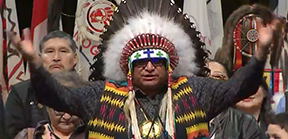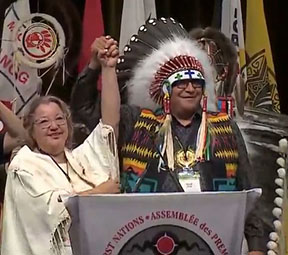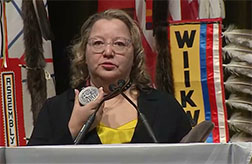Image Caption
Summary
Local Journalism Initiative Reporter
Windspeaker.com
Cindy Woodhouse has become the second woman in succession to be elected to head the Assembly of First Nations (AFN) and she’s already putting Canada on notice.
“To Canada and to Canadians, we need your support. You have to work with First Nations people in a good way. We are here in a good way…But at the same time, there’s a point where if you don’t listen to our people, you don’t listen to our chiefs, you don’t answer them, then there’s problems. And so, to Canada, we’re coming for you,” said Woodhouse in her first address as national chief.
A full day of voting yesterday concluded on the sixth ballot without a final result. The seventh voting round was held over till the morning because the Ottawa venue where the special chiefs assembly was being held closed at midnight.
This morning chiefs gathered to hear challenger David Pratt concede to Woodhouse.

Pratt and Woodhouse were the last of six candidates on ballots four, five and six.
Woodhouse led on every ballot with Pratt in second place.
At the end of the evening Dec. 6, Woodhouse had garnered 234 votes and 50.8 per cent support on ballot six, while Pratt had 181 votes and 39.3 per cent support. Four hundred and fifteen chiefs and proxies voted, representing 90 per cent of the 461 registered to vote. The AFN represents more than 630 First Nations.
The AFN Charter requires the successful candidate to receive 60 per cent of the vote.
However, for the second consecutive election, the new national chief received only slightly more than 50 per cent of support from the electors.
Woodhouse’s successor, RoseAnne Archibald, who was ousted earlier this year which forced the early election, took the position of national chief with 50.5 per cent support.
Pratt, who is vice-chief of the Federation of Sovereign Indigenous Nations, said conceding the race wasn’t easy, but it was the right decision.
“The issues are too important for us to hold back the next national chief from taking over. And I want to let the convention know today, I want all of our chiefs and I want all of Canada (to know) you leave here with one blurb from me: We leave here united. We leave here behind our national chief. We’re back and the future belongs to First Nations people,” he said.

A tense exchange between Woodhouse and Pratt was caught on camera by APTN in the evening between the fourth and fifth ballots. In the exchange, Woodhouse told Pratt the he had said he would concede. Pratt appeared to have admitted he made the comment, but admonished Woodhouse for raising the issue through his chiefs. Woodhouse walked away from the encounter.
Today, Woodhouse said that she and Pratt had had discussions the night before and in the morning about the next steps and “we came together in a good way.”
In her speech, she thanked the women trailblazers who came before her, including Archibald, who “smashed glass ceilings for all of us.”
It was a notable acknowledgement considering comments made by candidate Sheila North, who was dropped after the third ballot with 9.5 per cent support. She endorsed Pratt in her concession speech, inferring that Woodhouse played a role in the ousting of Archibald.
“As somebody just told me, behind the scenes here, women can be violent too. And we saw what happened with RoseAnne, with just six months left in her mandate and she was disrespected at the highest level. She did not deserve that. That doesn't mean I agreed with everything she did or how she did it, but she should have been given that respect to finish her term,” said North, former Manitoba Keewatinowi Okimakanak grand chief.
Archibald had a full year left in her mandate when she was voted out of her position. New Brunswick regional chief Joanna Bernard filled the position on an interim basis for six months. Woodhouse will serve the remaining six months of Archibald’s term as well as her full three years.
In her profile interview in November, Windspeaker asked Woodhouse about the allegations that she played a role in Archibald’s termination. Woodhouse said that was “false.”
“When it comes to the former national chief, I think that there was a unanimous consent across the country to try and limit liability. And at the end of the day, chiefs vote her in, chiefs were the ones that pulled her out. We were just doing the best that we can with what was happening at the time,” said Woodhouse.
Woodhouse said her first 100 days of action would include being “on the phone” that very afternoon and advocating for policing, justice, safe communities, and economic development.
She said she would push for full inclusion in the upcoming federal budget in March.

“Canada, you cannot forget First Nations. You take our money from our lands. You have to make sure that you work with us to get that out the door to our communities,” she said to applause.
Also running for national chief were former Batchewana First Nation chief Dean Sayers, former Alberta regional chief Craig Makinaw and former Muskowekwan First Nation chief Reginald Bellerose.
Sayers was dropped after the second ballot with 10 per cent of the vote. He endorsed North with a tweet stating he thought she “would make a good national chief.”
When the first round of voting was completed Makinaw was automatically dropped as he acquired less than 15 votes as set out by AFN Charter bylaws. He received eight votes.
Bellerose, who conceded to Archibald in 2021, was also dropped after the first ballot with only 7.9 per cent support.
Bellerose chose not to address the chiefs verbally after his loss. Instead he wrote a greeting, “in high spirits and good medicine,” and asked his supporters to vote for Sayers. He also linked his message to Sayers’ website.
Makinaw, who entered the race on nomination day, addressed the chiefs after his initial ballot loss and urged them to support the new national chief. He said that he and the other five contenders had made that commitment to each other and he would fulfill that commitment.
Chiefs this morning raised concerns about the election process noting that nowhere does the AFN charter say that a chief could be elected through the runner-up conceding. They also suggested amending the 60 per cent threshold to indicate those chiefs who have voted instead of having registered.

